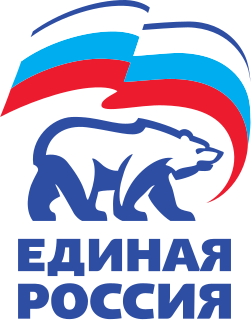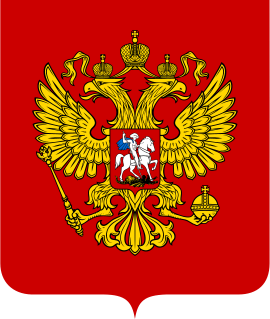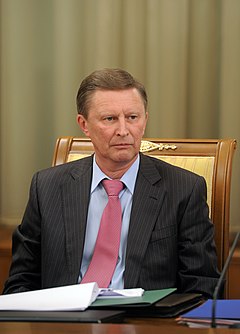This is a collection of scientific, public opinion polls that have been conducted relating to the 2012 Russian presidential election.
This is a collection of scientific, public opinion polls that have been conducted relating to the 2012 Russian presidential election.
| Poll source | Date |  |  |  |  |  |
|---|---|---|---|---|---|---|
| Putin YeR | Zyuganov KPRF | Zhirinovsky LDPR | Prokhorov Ind | Mironov SR | ||
| Levada | 16–20 Dec 2011 | 39% | 26% | 8% | 4% | 6% |
| Levada | 20–23 Jan 2011 | 54% | 27% | 5% | 2% | 1% |
| FOM | 21–22 Jan 2012 | 52.2% | 18.0% | 10.8% | 6.7% | 6.6% |
| FOM | 28–29 Jan 2012 | 52.6% | 28.9% | 3.7% | 2.9% | 2.9% |
| FOM | 4–5 Feb 2012 | 58.7% | 15.0% | 12.2% | 7.2% | 5.1% |
| FOM | 11–12 Feb 2012 | 35.0% | 54.7% | 2.5% | 1.4% | 4.0% |
| VCIOM | 11–12 Feb 2012 | 58.6% | 14.8% | 9.4% | 8.7% | 7.7% |
| Levada | 17–20 Feb 2012 | 52% | 24% | 3% | 2% | 1% |
| FOM | 18–19 Feb 2012 | 58.7% | 16.2% | 8.8% | 8.6% | 6.1% |
| VCIOM | 25–26 Feb 2012 | 51.9% | 25.1% | 7.7% | 3.7% | 2.1% |
| Candidate | 24 December 2011 | 24–25 December 2011 | 7 January 2012 | 14 January 2012 | 14–15 January 2012 | 21 January 2012 | 28 January 2012 | 12 February 2012 |
|---|---|---|---|---|---|---|---|---|
| Vladimir Putin | 45% | 44% | 48% | 52% | 45% | 49% | 52% | 55% |
| Mikhail Prokhorov | 4% | 4% | 3% | 2% | 3% | 4% | 4% | 6% |
| Gennady Zyuganov | 10% | 12% | 10% | 11% | 11% | 8% | 9% | |
| Vladimir Zhirinovsky | 8 % | 11 % | 9 % | 9 % | 10 % | 9 % | 8 % | 8 % |
| Sergey Mironov | 5 % | 4 % | 5 % | 4 % | 3 % | 6 % | 4 % | 5 % |
| Grigory Yavlinsky | 2 % | 2 % | 2 % | 1 % | 1 % | |||
| Dmitry Mezentsev | — | — | 0 % | 0 % | — | |||
| Other | — | 2 % | — | 0 % | 1 % | |||
| Would not vote | 10 % | 9 % | 9 % | 10 % | 10 % | 9 % | 11 % | 9 % |
| Plan to ruin ballot | — | 1 % | — | — | 1 % | |||
| Don't know | 12 % | 12 % | 10 % | 9 % | 13 % | 9 % | 10 % | 8 % |
| Sample Size | 1,600 | 3,000 | 1,600 | 1,600 | 3,000 | 1,600 | 1,600 | 1,600 |
| Poll Source | VTSIOM [1] | FOM [2] | VTSIOM [1] | VTSIOM [1] | FOM [3] | VTSIOM [4] | VTSIOM [1] | VTSIOM [1] |
According to a "Levada Center" opinion poll from September 2011, 41% of Russian people wanted to see Putin be a candidate in the 2012 elections as opposed to 22% for Medvedev, while 10% wanted someone else and 28% were unsure. [5]
| Candidate | % | |
|---|---|---|
| Vladimir Putin | 59.3% | 58.3% |
| Mikhail Prokhorov | 9.6% | 9.2% |
| Gennady Zyuganov | 18.2% | 17.7% |
| Vladimir Zhirinovsky | 7.4% | 8.5% |
| Sergey Mironov | 4.3% | 4.8% |
| Spoiled ballot | 1.5% | |
| Refused to answer | 31.7% | |
| Sample Size | 159,161 | |
| Poll Source | FOM [6] | VTSIOM [7] [6] |

Vladimir Vladimirovich Putin is a Russian politician and former intelligence officer who is the current president of Russia. He has been serving in this position since 2012, and he previously held this office from 1999 until 2008. He was also the prime minister from 1999 to 2000, and again from 2008 to 2012. Putin is the second-longest current serving European president.

United Russia is a political party in Russia. United Russia is the largest party in Russia, and as of 2021 it holds 326 of the 450 seats in the State Duma, having constituted the majority in the chamber since 2007. The party was formed in December 2001 through a merger of the Unity and Fatherland – All Russia parties.

On the federal level, Russia elects a president as head of state and a parliament, one of the two chambers of the Federal Assembly. The president is elected for, at most, two consecutive six-year terms by the people. The Federal Assembly has two chambers. The State Duma has 450 members, elected for five-year terms. The Federation Council is not directly elected; each of the 85 federal subjects of Russia sends 2 delegates to the Federal Council, for a total of 170 members.

Sergei Borisovich Ivanov is a Russian senior official and politician who has served as the Special Representative of the President of the Russian Federation on the Issues of Environmental Activities, Ecology and Transport since 12 August 2016.
Russian Public Opinion Research Center (VTsIOM) is a state-owned institution established in 1987, known as the All-Union Center for the Study of Public Opinion until 1992.

Dmitry Anatolyevich Medvedev is a Russian politician serving as Deputy Chairman of the Security Council of Russia since 2020. Medvedev served as president from 2008 to 2012 and as prime minister from 2012 to 2020.

The 2008 Russian presidential election was held on 2 March 2008, and resulted in the election of Dmitry Medvedev as the third President of Russia. Medvedev was elected for a four-year term, whose candidacy was supported by incumbent president Vladimir Putin and five political parties, received 71% of the vote, and defeated Gennady Zyuganov of the Communist Party of the Russian Federation, and Vladimir Zhirinovsky of the Liberal Democratic Party of Russia.

Russia and the United States maintain globally significant and strategic foreign-relations ties. Both nations have shared interests in nuclear safety and security, nonproliferation, counterterrorism, and space exploration. The relationship was generally warm under the Russian President Boris Yeltsin (1991–99) until the NATO bombing of Yugoslavia in the spring of 1999, and has since deteriorated significantly. In 2014, relations greatly deteriorated further due to the Russia's annexation of Crimea and Russian military intervention in Ukraine. It was reinforced by the Russian military intervention in the Syrian Civil War, and from the end of 2016 over Russia's interference in the 2016 U.S. elections and alleged interference in the 2020 elections. Mutual sanctions imposed in 2014 remain in place.
The Levada Center is a Russian independent, nongovernmental polling and sociological research organization. It is named after its founder, the first Russian professor of sociology Yuri Levada (1930—2006). The Center traces back its history to 1987 when the All-Union Public Opinion Research Center (VTsIOM) was founded under the leadership of academician Tatyana Zaslavskaya. Being one of the largest Russian research companies, the Levada Center regularly conducts its own and commissioned polling and marketing research. In 2016, it was labelled a foreign agent under the 2012 Russian foreign agent law.

Alexei Anatolievich Navalny is a Russian opposition leader, lawyer, and anti-corruption activist. He came to international prominence by organizing anti-government demonstrations and running for office to advocate reforms against corruption in Russia, and against President Vladimir Putin and his government. Putin avoids directly referring to Navalny by name. Navalny was a Russian Opposition Coordination Council member. He is the leader of the Russia of the Future party and the founder of the Anti-Corruption Foundation (FBK).

Legislative elections were held in Russia on 4 December 2011. At stake were the 450 seats in the 6th State Duma, the lower house of the Federal Assembly. United Russia won the elections with 49.32% of the vote, taking 238 seats or 52.88% of the Duma seats.

Opposition to the government of President Vladimir Putin in Russia can be divided between the parliamentary opposition parties in the State Duma and the various non-systemic opposition organizations. While the former are largely viewed as being more or less loyal to the government and Putin, the latter oppose the government and are mostly unrepresented in government bodies. Major political parties considered to be part of the non-systemic opposition include Yabloko and the People's Freedom Party, along with the unregistered party Russia of the Future and Libertarian Party of Russia. Other notable opposition groups included the Russian Opposition Coordination Council (2012–13) and The Other Russia (2006–11), as well as various non-governmental organizations (NGOs).
The public image of Vladimir Putin concerns the image of Vladimir Putin, current President of Russia, among residents of Russia and worldwide.

The propaganda of the Russian Federation is propaganda that promotes views, perceptions or agendas of the government of Russia. The media include state-run outlets and online technologies, and may involve using "Soviet-style 'active measures' as an element of modern Russian 'political warfare'". Contemporary Russian propaganda focuses on promoting a cult of personality around Vladimir Putin and the Russian government has also been highly actives in debates on Soviet history; Russia has established a number of organizations such as the Presidential Commission of the Russian Federation to Counter Attempts to Falsify History to the Detriment of Russia's Interests, the Russian web brigades and others that engage in political propaganda to promote the views of the Putin government.

The Putin-Medvedev tandemocracy is the joint leadership of Russia between 2008 and 2012 when Vladimir Putin, who was constitutionally barred from serving a third consecutive term as president of Russia, assumed the role of prime minister under President Dmitry Medvedev. While the office of prime minister is nominally the subservient position, opinion differs as to what extent Putin was the de facto leader during this period, with most opinion being either that Putin remained paramount or that he and Medvedev had similar levels of power. Putin was re-elected president in the 2012 election and Medvedev became his prime minister.

| Nostalgia for the Soviet Union or Soviet nostalgia is a social phenomenon of nostalgia for the Soviet era (1922–1991), whether for its politics, its society, its culture, or simply its aesthetics. Such nostalgia occurs among people in Russia and other post-Soviet states, as well as among persons born in the Soviet Union but long since living abroad, and even among Communists and Soviet sympathizers from elsewhere in the world.
This page lists public opinion polls in connection with the 2018 Russian presidential election.

The 2017–2018 Russian protests were a long series of countrywide street protest actions and demonstrations in the Russian Federation, which were primarily concerned with suppressing corruption in the Russian government and abandoning the planned retirement age hike.

A constitutional referendum was held in Russia between 25 June and 1 July 2020. President Vladimir Putin proposed the referendum during his address to the Federal Assembly on 15 January 2020. The draft amendments to the constitution were submitted to a referendum in accordance with article 2 of the Law on Amendments to the Constitution. The referendum is legally referred to as an "All-Russian vote", for it is not held in accordance with the Federal Constitutional Law on the Referendum.

This article is about the political impact of the COVID-19 pandemic in Russia.